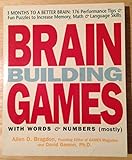Study Skills and Brain Training Techniques

Do Study Skills and Brain Training Go Hand In Hand
I think everyone already knows that if you need to take an exam to earn your qualification at the end of a study period then you are definitely going to need to remember elements of the course material. Ideally the bits that they are going to ask you in the exam, bit of a no brainer really if you will excuse the pun.
On the other hand if your study skills are required to be geared towards ongoing continual assessment then memory skills are less of an issue. Unless of course you want to retain the information for future use and reference. In which case a bit of brain training and identification of techniques that can help you remember your studies will come in very handy. Most people having gone through the trouble of learning something in the first place would love to have the ability to remember their studies indefinitely. Even if that is only so they can impress friends, family and colleagues with their level of knowledge on certain subjects without having to refer to a book. I know I was always jealous of the people who could recall Einstein's theory of relativity without even glancing at a text book; not that I met that many that could.
What all this is leading to is that study skills and brain training do go hand in hand. Brain training referring to the ability to remember and recall facts and information on demand. This ability is a highly sought after skill and there is a great deal of interest in the techniques that can help you increase memory power.

Study Skills
Its not just brain training its physical training as well
Building 'Note Taking' Into Your Study Skills
A primary technique that anyone developing study skills needs to understand is the power of taking notes. The reason note taking is so powerful is down to a few factors
- You have to listen to or read the information and then reconstruct it in your own words, diagrams, pictures etc.
- The process of note taking ensures you are paying attention during an audio lesson and actually deciphering written or visual information in preparation for your interpretation or version of events
- the process of note taking ensures that the information has been taken in and processed at least once
It doesn't really matter how you take notes, there are several techniques. All you need to decide is which technique suits you the best. It could be producing short simple sentences, writing bullet points, drawing pictures, diagrams or a combination of them all.
The important point is that by taking notes you are actually participating in 'Active Learning'.
The active learning technique is enhanced by testing your understanding i.e. you can ask questions of yourself or your tutor. In other words when you have made your notes check that they make sense and are a good interpretation of the material presented. If there are any sections that don't make sense then try and find out why. If you think you are wrong or you don't understand, then take positive action to correct the information and your level of understanding.
Brain Training Includes Physical Conditioning
Study skills includes recognising when the conditions are wrong. For example if you are too hot or too cold you will not be able to study effectively. Most offices that you will encounter in the workplace will be operated at a controlled temperature of around 21C and there is a good reason for this; that is the optimum temperature for productivity. People operate more effectively in an environment that is comfortably warm.
It goes further than just physical comfort though, it is also about being physically able and fit and this includes being well rested and ready for work. So a proper diet of the right food types, regular exercise and getting enough sleep will contribute to your ability to study effectively. For those old enough, it is also about controlling your alcoholic intake to sensible levels and abstaining completely when you have important periods of study to consider .
Bet that caught you by surprise, yes brain training techniques are important but study skills are holistic in nature and they have both physical and mental considerations.
It is also worth considering that each individual has strengths and weaknesses when it comes to remembering. What is meant by that is that there are different types of memory, olfactory memory is remembering smell for example. The two types that most people remember best by are auditory and visual memory i.e, you remember what you hear the best or what you see the best.
What that means in practical terms is that depending on how you remember, you should either listen to audio or perhaps read information to remember. That doesn't detract from note taking, you can still take notes for whatever sensory input suits you best.
Memory Skills Games - Improve Your Memory Skills with Games
Playing memory skills games isn't guaranteed to help improve your memory skills, but what they may show you are the techniques that are available that will. Because improving your memory is not so much about what you do, but how you do it.

Study Skills - Revision
Preparing for an exam or a test module is a skill in itself. It is mostly about deciding on your revision techniques and then planning your revision periods. These are a few pointers to give you an idea of how to approach revision
- Figure out your alertness levels, i.e. when your studying is likely to be most effective
- Don't overdo how long you study for, it is better to have a 40 minute period and take a break than to try and study for too long and get bored or tired
- Make sure you actually understand the material, you cannot learn something you don't understand
- Revise with others so that you can compare notes
- Understand that you can never over learn a subject, revisit it regularly to fully establish it in your mind
List learning is a great way to revise and if you prefer using a computer you might like Cram Horse assuming you can still download it these days. The basis is a card that you list your revision points on and then try and learn off by heart. Look at the list, turn the card over and write it out completely and then check. If you get it wrong you simply repeat until you get it completely right. Cram Horse is a software program that lets you do that on a computer.
Brain Training
Improving Memory Power is it Just a Chemical Equation?
A recent theory on how we remember revolved around a substance called RNA (Ribonucleic Acid). When we are memorizing there is an increase in the amount of RNA accompanied with changes in its chemical structure. It is these chemical changes that were supposed to help us retain our memories. Latest thinking suggests that may not have been strictly true, see the Wiki below.
More recently the theories suggest we have different stages of memory:
- Registration of information
- Temporary retention of information
- Permanent retention of information
The first stage is where we either accept of reject the information being received from sensory receptors, sound, smell, sight etc. The second stage is short term memory where we store the accepted information for a brief period and further select information for passing on into long term memory where there is the potential to store that memory for a lifetime.
Information held in short term memory that is not passed onto long term memory might be for example information that is required for processing a solution to a problem and after the problem is resolved the information is discarded. Mental arithmetic is a good example.
Knowing What Makes Us Forget Can Help Us Improve Memory Power
One of the key factors to not remembering or forgetting is not learning in the first place. How many times have you been introduced to someone and immediately forgotten their name. Or actually did you just not register the name, were you paying attention or were you distracted or thinking about something else considered to be more important, even if that was subconsciously.
The basic rules of remembering are:
- You have to be interested
- You have to pay attention to the subject matter
- Understanding is a key to learning, if the principle of something is fully understood then you are much more likely to recall it
- Use it or lose it, in other words to remember you have to revisit the subject and remind yourself of the content otherwise there is a chance your brain will de-clutter itself and clear out the unused data
- Be confident, if you whaff about and lack confidence you trick your brain into not recalling properly and actually when you communicate a memory without any confidence you are likely to be less than convincing
- Test yourself, don't assume you have learned make sure you have learned
Now you are ready to get organised, adopt the tidy house tidy mind concept. Generally if your house is tidy you can usually find things more easily. Likewise with your mind, if you can find a way to organise your memories into categories or sequences then when you need to recall them there is a higher likelihood that you will be successful.
Again you need to find a method of organising that suits you, there are a number of techniques to chose from:-
- Association, where you associate one fact with another. They don't even have to be related as long as it works for you. You might remember a name of someone by associating their name with an object, an event or whatever else you can think of. For example Mr Wright could be associated with a big tick, even better if you can dress the tick in Mr Wright's jacket or give it a characteristic you associate with Mr Wright , big ears maybe
- Linking, this is where you may have to remember a list of items, so you link one to the other and pair them up. If you remember the first item and it is paired with the second item, you remember the second item. Then the second item is paired with the third and so on it could follow a story or be a simple pairing by creating an image of the two things together.
- A place for everything an everything in its place, put the things you remember in a room in a make believe house and then you have to remember what you put in which room. By associating or linking the object to a room you make it easier to remember because now it has been categorized
- Keywords, if you need to remember a sentence, extract 3 keywords from the sentence ideally from the beginning, middle and end. Link them together and use the 3 keywords to recall the whole sentence.
I would imagine by now that you are getting the idea. How you organize your memories or things you need to recall is really a question of personal preference and knowing what works best on an individual basis. Some people are very quick to make up little rhymes where others are good at creating images or making up a story. Different techniques work better for the different types of things you have to remember so you need to experiment and practice the techniques and methods that suit you. Just as long as you find a way to get organized because that is the key.
It's much the same when you want to know how to write and publish a book especially your memoirs, it's all about organizing your memories and putting them into a sequence that is in some way, interesting, amusing, entertaining or a combination of all three. People tend to remember the things that happen that come under those categories.
Total Recall - Certainly Messed up His Memory Performance
Brain Training Strategies & Techniques
Have you used a brain training technique?
Study Skills Additional Resources
- Learn Chinese
Learn one of the most spoken languages on the planet with our software.












